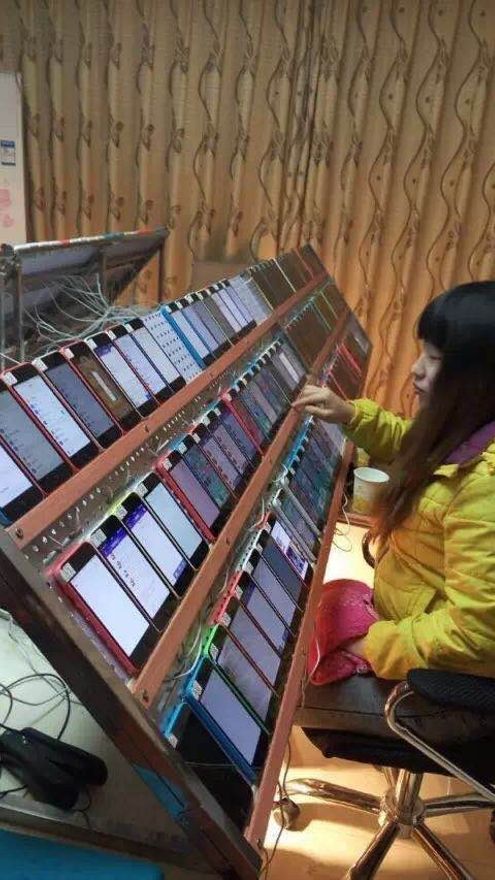Most “Click Farms” are located in countries such as Bangladesh, China, India, or Thailand, among others, and their business is based on “inflating” the social media accounts of those who ask for it.
WORLD, (May 21, 2021).- A new app has just appeared in the Play Store, the Google store. It barely has 24 hours of life but it already accumulates five stars and hundreds of positive evaluations. At the same time, on Facebook, a page dedicated to zucchini raises ‘likes‘ like crazy. On Instagram, someone buys 10,000 followers for their new fashion profile at 0.005 euros each. Everything happens in a matter of minutes.
In Bangladesh, a man who works in government offices during the day goes to a small building in the center of Dhaka, the capital, in the afternoons. In his spare time, he harvests likes in a click farm with hundreds of mobile phones, most of them second-hand. In them, he touches the pages, the ‘likes’ or the publications that he has to upload that day. He doesn’t earn more than $ 120 (€ 105) a year, but his work sells for $ 15 for every 1,000 likes he does.

Facebook introduced the ‘Like’ button in 2009. Four years later we already heard about click farms for the first time, thanks to a report by The Guardian that made visible what many had seen for a long time but none could find an explanation. The rapid increase in followers on an Instagram or Twitter account, the thousands of likes harvested by a Facebook page in just a week, or the reviews and positive evaluations in an app that had just been launched on the market recently were already justified.
In May 2017, a video showing what a click farm looked like inside went viral on social networks. It was published by the English Russia account and it featured hundreds of mobiles working alone, rapidly switching between screens and, in many cases, seemed to be in sync. The phones were connected to a computer that told them which song to play on Spotify, which page to like, or which app to upload.
Harvesting likes and then selling them? Is that possible?
Just under two years ago, Thai police arrested three Chinese men in Bangkok for not having work permits and for smuggling mobile phones. They were not accused of managing a click farm, as they actually did, or for having in their possession at the time of their arrest more than 340,000 SIM cards and 400 iPhones. This video shows the farm inside, with its phone holders and card racks stored in one corner of the room, which serves as a key function. They earned between $ 3,000 and $ 4,400 a month.
Not all farms are the same: some are automated while others have humans touching the screen throughout the day. In other cases, they create fake profiles for Twitter or Facebook.
Most click farms are located in countries such as India, Indonesia, China, the Philippines, Iraq, or Bangladesh, among others and, although it depends on the size, they do not usually have more than eight or ten workers. Each of them has a computer from which they create people from scratch: first, they generate a profile through this website, then they open an email account with that name, take a photo from an image bank and link a SIM card with these dates. The card is necessary to skip an inevitable step when creating an account on any social network: user verification via mobile phone.
These farms work on demand, so a quick search on the Internet returns hundreds of pages that offer the purchase of followers on Twitter and Instagram or likes on Facebook. It depends on the site, but for about 55 euros you can get 10,000 subscribers on Instagram at a stroke or 2,500 ‘Likes’ for our Facebook page for 70 euros.

A difficult problem to tackle
The process of how it is done is detailed in this documentary, Field of Vision – Like, which can be seen on YouTube. Recorded in Bangladesh, the employees of a click farm explain how much they cost and how they work; a modus operandi not very different from the one detailed by Clark in his article. In this case, they are dedicated to increasing the ‘likes’ of the publications or pages that their boss shares with them through a closed group on Facebook itself.
In January, a study by Aaron Greenspan, a former partner of Mark Zuckerberg, claimed that 50% of the users of the social network were fake. In 2018 alone, Facebook made nearly $ 34 billion from ads, which accounted for 60% of its total revenue for that year. Other platforms such as Twitter and Instagram have tried to curb the proliferation of bots and fake accounts, but it is a difficult problem to tackle as long as click farms continue to exist. The data that remains over time is that only in Bangladesh between 30 and 40% of paid likes are generated on Facebook.
Source: El Diario ESPAÑA


